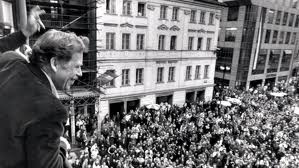Vaclav Havel was a great inspiration and a role model for the whole of the European human rights movement. He was instrumental in the establishment of Helsinki Watch at the end of the 1970s and had close contact with the international Helsinki movement. His importance in the efforts for a democratic and free Europe based on respect for human rights is enormous, says Engesland.
Leader of Velvet Revolution
 As a playwright and dissident already from the 1960s Havel played an important role in the struggle against the authoritarian communist rule in Czechoslovakia. His popular appeal was broad, and as the author of the essay “The power is wasted power,” which deals with the communist dictatorship manipulation, and plays like the “Audience” and “Protest”, Havel was an important person in the Czechoslovak people’s consciousness.
As a playwright and dissident already from the 1960s Havel played an important role in the struggle against the authoritarian communist rule in Czechoslovakia. His popular appeal was broad, and as the author of the essay “The power is wasted power,” which deals with the communist dictatorship manipulation, and plays like the “Audience” and “Protest”, Havel was an important person in the Czechoslovak people’s consciousness.
Vaclav Havel was one of the architects and founders of the Charta 77, a landmark policy document in which key intellectuals demanded democracy and freedom in Czechoslovakia, and marked a clear opposition to the communist dictatorship. Havel was the spokesman for the movement and was imprisoned in 1979. His imprisonment lasted until 1982. Havel was also central to the Velvet Revolution in 1989, which marked the end of communist rule in Czechoslovakia. Havel was elected president of Czechoslovakia in 1989, and became the Czech Republic’s first president after the division of 1993, a position he held until 2003.
 Having suffered from respiratory problems for many years, he died at his country home in Hradecek, north-east of Prague, where he was being looked after by his wife Dagmar Havlova. He had suffered “circulatory failure, the result of all health problems he had experienced, starting with pneumonia he had suffered from in prison”, his doctor Tomas Bouzek told Czech media. Havel had part of a lung removed during surgery for cancer in the 1990s and had moved to his country home for health reasons in the summer, returning briefly to the capital to meet Tibetan spiritual leader the Dalai Lama earlier this month. One report said the former dissident had died after making plans with his wife for a quiet Christmas party. He had gone back to sleep and did not wake up again. A week of mourning is being held in the Czech Republic and hundreds of candles were lit on Sunday night in Wencelas Square – once the focal point of the “Velvet Revolution” that overthrew the country’s communist regime.
Having suffered from respiratory problems for many years, he died at his country home in Hradecek, north-east of Prague, where he was being looked after by his wife Dagmar Havlova. He had suffered “circulatory failure, the result of all health problems he had experienced, starting with pneumonia he had suffered from in prison”, his doctor Tomas Bouzek told Czech media. Havel had part of a lung removed during surgery for cancer in the 1990s and had moved to his country home for health reasons in the summer, returning briefly to the capital to meet Tibetan spiritual leader the Dalai Lama earlier this month. One report said the former dissident had died after making plans with his wife for a quiet Christmas party. He had gone back to sleep and did not wake up again. A week of mourning is being held in the Czech Republic and hundreds of candles were lit on Sunday night in Wencelas Square – once the focal point of the “Velvet Revolution” that overthrew the country’s communist regime.
Vaclav Havel was a peace-loving European. He will be greatly missed.





